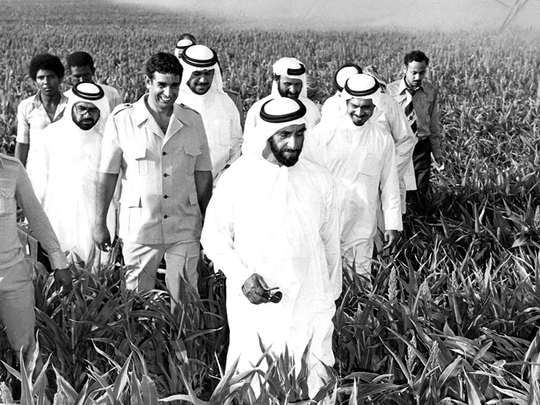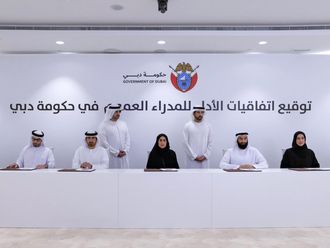
Eight words that continue to resonate among Emiratis generation after generation which align with the abiding beliefs and values of the father of the nation, Shaikh Zayed Bin Sultan Al Nahyan, and embody his passion and love towards the environment.
These words follow a true story from the time of Shaikh Zayed when he realised one of Al Ain’s oldest trees was going to be lost for the sake of building a new road.
A story special to many, including Laila Mostafa Abdullatif, director-general of Emirates Wildlife Society-World Wildlife Fund. Recounting the story, she said that Shaikh Zayed was on a tour of Al Ain’s early development projects when he noticed one of the city’s oldest trees growing on a path that was planned to be developed into a road.
“When he learnt of the proposed plan to cut down the tree, he demanded the tree be left in its place and the road be constructed around the tree instead. Shaikh Zayed understood the link between the environment and human well-being — that we must coexist and our progress cannot come at the cost of resources that are the right of our future generations,” says Abdullatif .
His commitments to the environment were not only through words, said Abdullatif , but through action that saw him safeguard the country’s natural riches — from the wildlife, birds, trees to the sands, seas, and deserts.
“Shaikh Zayed adopted conservationists’ values as a matter of conviction and necessity,” she said. “He loved nature and wildlife and, above all, he understood the importance of preserving every drop of water and putting it to productive use.”
When the endangered Arabian Oryx neared extinction during his time, Shaikh Zayed made quick decisions to ensure its survival.
“One of Shaikh Zayed’s many commitments to the environment was arranging for the capture of two breeding pairs of the Arabian Oryx to form the nucleus of a captive-breeding programme,” she said.
MORE ON SHAIKH ZAYED:
• Zayed: The man who tamed the desert
• Head start to conservation
• Focus on falconry
• Greening the desert from water, not oil
Today, the number of Arabian Oryx in the UAE has increased to over 10,000. These efforts have led to the International Union for the Conservation of Nature (IUCN) down listing the status of the Arabian Oryx from endangered to vulnerable.
Protecting the falcon
Abdullatif says Shaikh Zayed’s contributions extended to protecting the falcon which later had a significant impact on the reduction of illegal hunting activities in neighbouring countries. “He was the brainchild behind issuing passports for falcons to establish an identification system, which was adopted by CITES (Convention on International Trade in Endangered Species of Wild Fauna and Flora).”
Considering herself fortunate to have witnessed his legacy while he was alive and seeing the examples he set for the youth by caring about the environment, she said, “His vision made us understand that we must conserve our land and its gifts out of passion as well as duty.”
“Of the many crucial decisions he made, one was bringing the environment into the classroom and giving the youth a chance to contribute to this cause from a young age. It was actions like this to involve the general population that led to the setting up of conservation funds dedicated to the wildlife of the UAE,” she said.
- Laila Abdullatif | EWS-WWF chief
The UAE today, inspired by Shaikh Zayed’s determination, has taken strides in conservation, she said.
“Walking on the path laid by Shaikh Zayed, we became the first country in the Arab region to celebrate Earth Hour, as well as the first Gulf country to ratify the Paris agreement combating climate change,” she said.
EWS-WWF, a leading environmental organisation in the UAE, is driving positive change to conserve the country’s natural heritage for future generations as per the vision of Shaikh Zayed.
She said the UAE has several priorities for the future of its land, from protecting wildlife by passing laws that ban the possession of exotic animals to projects such as the Gulf Green Turtle Project, or involving the youth through education programmes that help the survival of wildlife as well as the identification of important areas.
“I believe the most crucial lesson and an imperative message to pass on to our children is that the UAE is home to the current as well as forthcoming generations. We need to leave our land behind as it was given to us. Shaikh Zayed emphasised this point when he once said, ‘Our forefathers survived on this land because they recognised the need to conserve it, to take from it only what they needed to live, and to preserve it for succeeding generations’.”
Shaikh Zayed received a number of prestigious awards for his efforts in prioritizing the environment including WWF’S Golden Panda, the United Nations Environment Programme’s Champion of the Earth award and the Duke of Edinburgh prize awarded by Prince Philip, the president emeritus of WWF.












